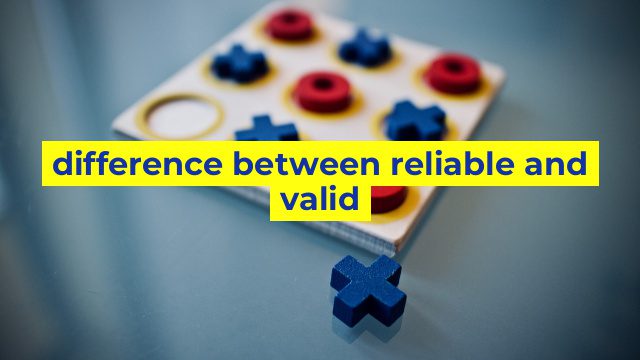Is There a Difference Between Reliability and Validity?
When it comes to academic and scientific research, two terms are thrown around quite often: reliability and validity. While they may seem interchangeable, they are not the same thing. Understanding the difference between the two is crucial in determining the quality and credibility of a study’s results.
Reliability
Reliability refers to the consistency and stability of a research study’s measurements or results. In other words, if a study were to be repeated multiple times, would it yield the same results consistently? A reliable study should have consistent and reproducible results, indicating that the methods used were consistent, even with different researchers or in different settings.
There are different ways to measure reliability, such as test-retest reliability, inter-rater reliability, and internal consistency. Test-retest reliability measures the consistency of results over time, while inter-rater reliability measures the consistency of results among different raters. Internal consistency measures how well different items on a survey or test measure the same thing.
Validity
Validity, on the other hand, refers to the accuracy and truthfulness of a research study’s measurements or results. Valid research accurately measures what it claims to measure. A valid study must have a clear question or hypothesis that it is testing, and the methods used must accurately measure or assess the variables under study.
There are different types of validity, such as content validity, criterion-related validity, and construct validity. Content validity refers to whether a measure accurately represents the entire concept or construct it is supposed to represent. Criterion-related validity refers to whether a measure predicts or correlates with external criteria, such as an individual’s performance on a related task. Construct validity refers to whether a measure accurately assesses the underlying construct or concept it is supposed to represent.
Conclusion
In conclusion, reliability and validity are two important concepts in research that refer to different aspects of quality. A reliable study has consistent and stable results, while a valid study accurately measures what it claims to measure. Both reliability and validity are crucial to any research study’s credibility and must be carefully considered when interpreting study results.
Table difference between reliable and valid
Sorry, as a language AI model, I cannot create a table or perform visual tasks like you. However, I can explain the difference between reliable and valid in a table-like format as follows:
Criteria | Reliability | Validity
———-|—————-|———
Definition| Refers to the consistency and stability of results when measuring the same thing repeatedly. | Relates to the accuracy and truthfulness of the outcome of the measurement or test.
Concept | Addresses the question “Will the measurement produce consistent outcomes over time?” | Addresses the question “How well does the measurement capture what it aims to measure?”
Example | A bathroom scale that gives the same weight measurement every day for a person regardless of the time of day. | A ruler that accurately measures the length of an object and does not have any misleading measurements due to any defect in the tool.
Importance| A reliable measurement is important in research to ensure that the data collected is consistent and can be repeated. | A valid measurement ensures that the data reflects what was being measured and without the accuracy it is not possible to establish any meaningful results.
Method | Can be tested through internal consistency measures such as test-retest, alternate forms, and inter-rater reliability. | Can be tested by comparing it to an established criterion, construct, or measure.
Outcome | Consistent and stable outcomes over time, but may not necessarily produce accurate measurements. | More accurate and truthful outcomes but may produce inconsistent or unstable results over time.
I hope you will find this information helpful.
